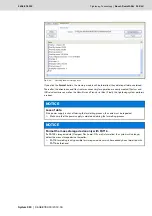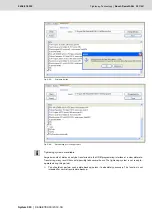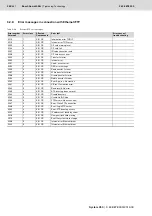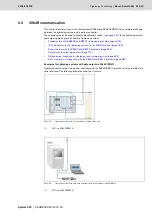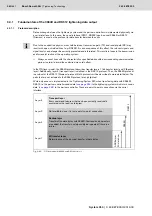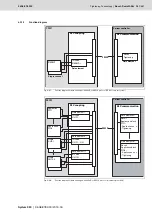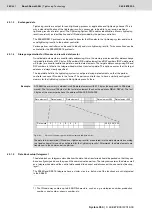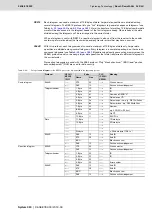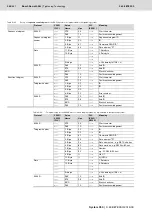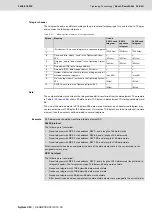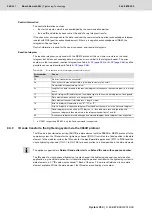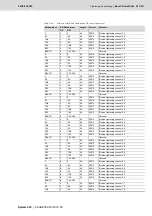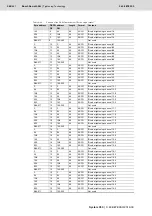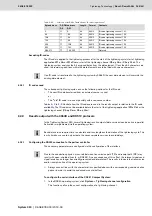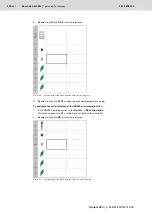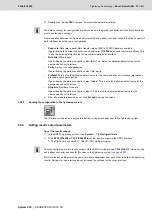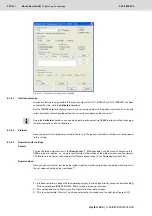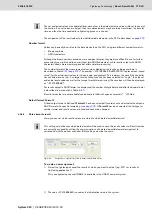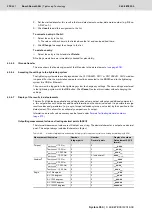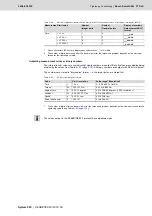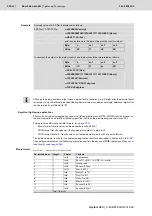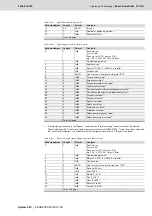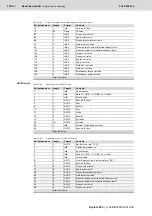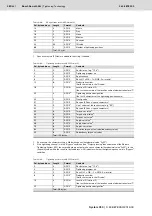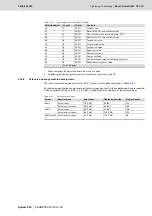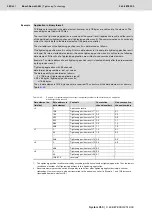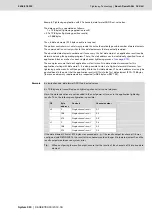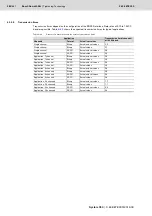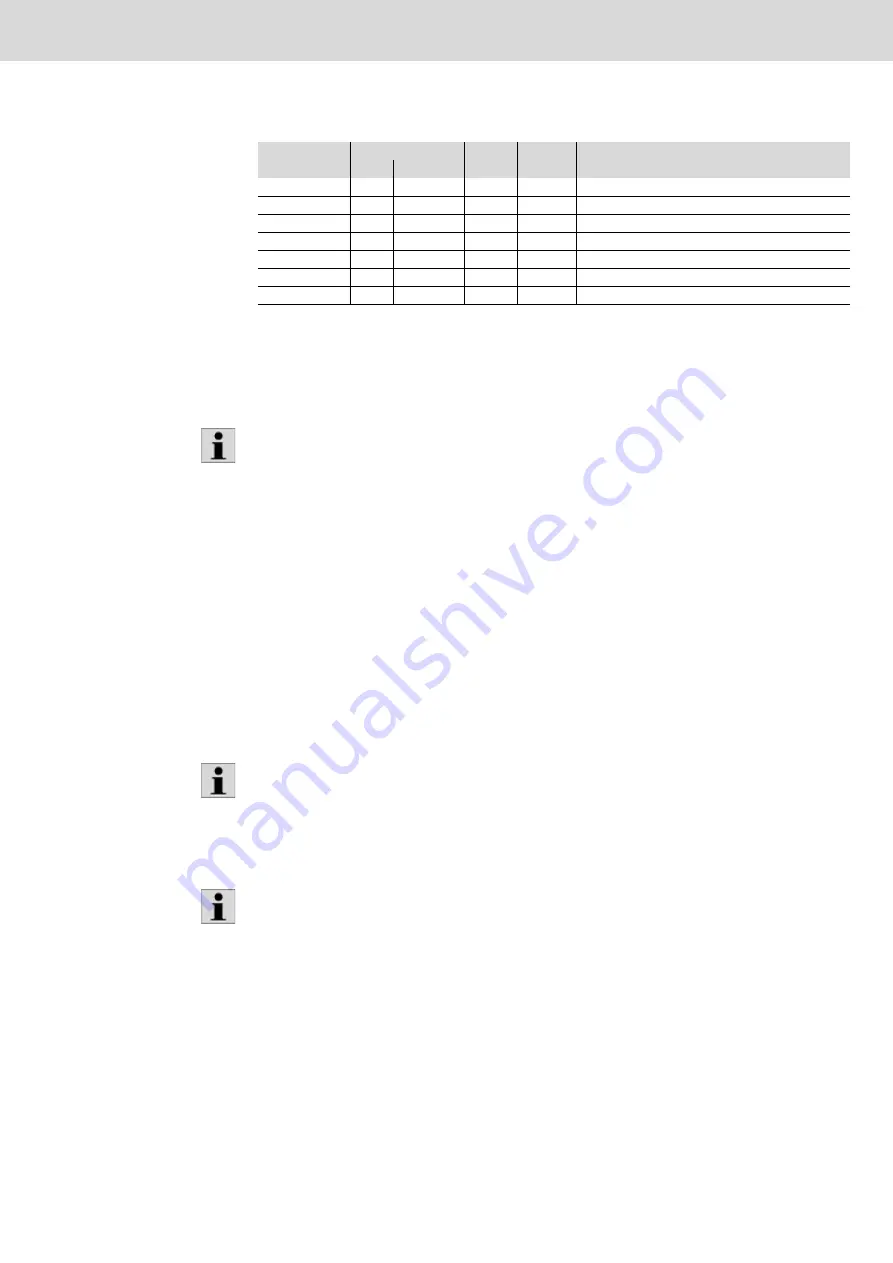
3 608 878 300
Tightening Technology |
Bosch Rexroth AG 269
System 350
| 3 608 878 300/2019-03
Accepting ID-codes
The ID code is applied to the tightening process after the start of the tightening cycle (start of tightening
application
FO x Cw
or
FO x Ccw
or start of the tightening channel
Ch x.y Cw
or
Ch x.y Ccw
). The
tightening system analyzes the 64 assigned bytes from the data element. If less than 64 characters are
used, the remaining positions within the data element have to be filled with space characters.
6.3.2.1
ID codes used
The subsequent tightening cycle can use the following options for the ID-code:
•
The new ID-code transferred from an external source is used.
or
•
The “"old" ID-code is re-used, possibly with a sequence number.
Tables
illustrate how the ID codes are used in the results output in relation to the ID code
availability. The ID code must be available before the start of the tightening application (
FO x Cw
) or the
tightening channel (
Ch x.y Cw
or
Ch x.y Ccw
).
6.3.3
Results output with the 3964R and RK512 protocols
In the Tightening System 350, several tightening results outputs (data services) can be active in parallel.
Activation is implemented via the operating system.
6.3.3.1
Configuring the RS232 connection to the partner controller
The necessary parameters are configured via the configuration of the interface.
To configure the serial interface of the CS351 Compact System:
1.
In the BS350 operating system, click
System
Tightening channel configuration.
This function calls up the current configuration of a tightening channel.
0
17
0
64
ASCII
ID code tightening channel 15.1
64
17
32
64
ASCII
ID code tightening channel 15.2
128
17
64
64
ASCII
ID code tightening channel 15.3
192
17
96
64
ASCII
ID code tightening channel 15.4
256
17
128
64
ASCII
ID code tightening channel 15.5
320
17
160
64
ASCII
ID code tightening channel 15.6
384-511
17
192-255
Not used
Table 6–29:
Structure of the D2-D17 data element "ID code single channel"
Byte address
DE-DW address
Length
Format
Contents
DE
DW
If an ID-code is transferred to the tightening system by 3964R, the new data element will overwrite the
existing data element.
Each data service requires time to calculate and thus lengthens the duration of the tightening cycle. This
is why it makes sense to only activate the necessary data services to avoid delays.
Due to the conduction physics, cross-talk between transmission path (TX) and receipt path (RX) may
result with open, shielded lines (e. g. RS232). As a consequence of this effect, the relevant signals and
signal levels can no longer be correctly presented and interpreted. This results in loops in the transmission
and/or receipt routine of the operating system.
Always connect lines with the characteristics specified above with a corresponding communication
partner in order to avoid the undesired cross-talk effect.
Summary of Contents for Rexroth Tightening System 350
Page 4: ...4 641 Bosch Rexroth AG Schraubtechnik System 350 3 608 878 300 2019 03 ...
Page 120: ...120 641 Bosch Rexroth AG Tightening Technology 3 608 878 300 System 350 3 608 878 300 2019 03 ...
Page 194: ...194 641 Bosch Rexroth AG Tightening Technology 3 608 878 300 System 350 3 608 878 300 2019 03 ...
Page 638: ...638 641 Bosch Rexroth AG Tightening Technology 3 608 878 300 System 350 3 608 878 300 2019 03 ...

